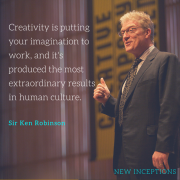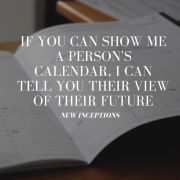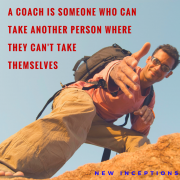How Do You Creatively Express Yourself?
Creativity is putting your imagination to work, and it’s produced the most extraordinary results in human culture. – Ken Robinson
What does it take to get to the pinnacle of your industry and be fulfilled? Does it take skill? Does it take engagement with others? Does it take working long hard hours?
Be it being a motivational speaker or an engineer, there is something that both of these people must learn how to do to be fulfilled while they work. And as you might realize, it’s about being creative in what you do day to day that will make you fulfilled. Those that are creative have fulfillment in their lives. While those that don’t have creativity in their lives, might be successful, their success is not their own. They’re possibly doing stuff they don’t care too much about.
So how do we get in the zone to be creative? How do we get to a point where we know that the work we’re doing is expressing ourselves? That’s
For me, I’ve always been creative when I interact with people. A lot of people consider me one of the most transparent people they know. And as a connector, I think it’s important that I have a certain level of authenticity. And whether I’m connecting with mechanics who love working on cars or high ranking business types, I try and stay the same person. However, as I’m as much as an introvert as I am a extrovert, I have to get ready to be engaging with those folk. Heck, even writing blogs posts, making podcasts, or working on future works takes creative energy.
Everyone gets their creative juices rolling differently. I mean, not everyone is a connector and I wouldn’t expect that what works for me, work for you. However, I will say that there is a framework you can use when you’re trying to be more creative.
Habits of Highly Creative People
When you think of people who are successful, (and I mean in whatever view you think of success being defined as) do you believe that particular person is expressive of who they are?
More than likely, you do.
When you think of Steve Jobs from the quote above, do you believe that he had his own certain way to do stuff? That he had time that he sat aside to think about what was next? When he presented himself, did he have a certain way he did that?
Of course, the answer to all of these is yes.
Creative people (and not just business owners and visionaries) have certain routines that they go through that makes them who they are on a day to day basis. Whether or not it’s using a meditation app, or the actual way they work, there are certain habits that all creative people have.
They are Creative By Themselves.
When it comes down to it, it’s hard to be a creative at the flick of a switch in front of people. If you’re lucky, you might have a gift and be able to convey a concise idea right on the spot for a presentation. Or you might be able to just strum up a tune on your guitar. For most of us, though, we have to go through a creative process that allows us to hone our skill before our big presentation.
Before executing, I find it useful to go through the following steps.
Habit 1: They Meditate (or Zone Out) – There are multiple ways that you can meditate, or what I call it, zone out. (And when I’m saying zone out, I mean purposely get to a point where your mind is clear.) For some, the actual exercise of what could be labeled as meditation is what works for them. For others, doing yard work, or exercise let’s them zone out. Yet others might not be able to fully go into a trance, but perhaps video gaming, drawing, or using Autonomous sensory meridian response (ASMR) might get you close enough.
The reason that I believe that meditation (or zoning out) is important is because it helps you erase your mind’s chalk board. Without it, you’re just adding layer upon layer of thought. Focus becomes really hard… and you need to focus to create.
Habit 2: They Plan – This is a highly important aspect of being a creative. Otherwise I wouldn’t focus so much on it so much myself. My planning methods have been mentioned pretty recently. So hopefully you took some notes.
Habit 3: They Reflect – Another aspect that you can’t afford to not do. One thing you need to check regularly is whether or not what you’re doing is making you happy. If you’re not, figure out an escape plan. It might be difficult to deal with some of your demons, but in the end it’ll be worth it.
In business, we call this studying your metrics. You have to check your own metrics to make sure you’re getting things done that is worth your time to do. If you do repetitive stuff, perhaps you don’t need to reflect as much, but it’s still important to know if you’re going on the right course or not. If you’re an artist, asking yourself are “people happy with my work” is just as important as asking yourself “is my work selling at the right price?”.
Habit 4: Their Work Space Reflects Who They Are – This is something I haven’t touched on before, but I think it’s something that I know is vital to my ability to get things done. You need to be comfortable in the space that you spend the most creative time in. The best and easiest way to do that is to design it yourself. Do your own Feng Shui if need be, but make sure that you know where things are and that it’s to the level of chaos that you can operate in. (Tip: You know you’re done making it your own when others can tell what kind of person you are after seeing it.)
They are Creative with Others.
Once we have the planning and practice thought through, it’s time to execute. Or as others might say, play. You do this by using your voice. In this post, we talked about what it meant to find your voice and why finding your voice is important. Specifically, that it gives you confidence to be yourself. However, many times we can find our voice in something other than the verbal meaning. Many times our work reflects what we’re saying.
Habit 5: They Show Creativity through Engagement – When we’re engaged in our own work, we’re expressing ourselves.What does your work say about you? When you were a kid, were you concerned with what other people thought of your sand castle? Probably not. Were you concerned with what others thought about you exclaiming that you were Leonardo or that your dad was Hulk Hogan, or perhaps you wanted to be like Mike?? Probably not.
As adults, we think such things are so trivial. But are they? I believe that early on, people portray who they are and what they see themselves as by idolizing people and/or ideas that sync with that. It’s when other people and the adult world tells them to grow up that we start disconnecting with what makes us unique. I think the only difference that we need to realize as we grow older is that we make a living based on how we add value to others. Most of society says that’s through a J.O.B., but as creators, we know that’s not necessarily the case. We can still be our own creative selves and add value to others too!
When you express yourself through your work, simply ask yourself these questions: Am I sharing my true thoughts, feelings, frustrations, and dreams? Do I feel the best of me is coming out when I create? Do I see myself making a living off of this work? If your answer to any of these questions is no, it might be time to open up a little more or figure out how your work can add value to others.
Habit 6: They Show Creativity in How Their Work Defines Them – When you do work, do you have the end in mind when you’re doing that work? Does your work reflect how you want people to think of you? If you’re being rejected for who you truly are or for your contributions you believe are creative and valuable, then that might be a sign that you’re in the wrong place or community. Unless you want to give up on your dreams and end up as a cog as part of a machine that works for it’s designers, don’t silence yourself. When you work yourself into your work, there’s a much higher chance that ultimately your work will tell the world who you are and were.
Homework:
So how do you get in the zone? How do you make sure you’re expressing yourself in your work? If you’re having issues doing either one, I hope the above helps you to think about how you can improve your creative flow. I know for me, meditation is key to be creative. I need to clean the slate. Sometimes I do it through walking my dogs, sometimes I do it through doing a bit of yard work, other times it might just be listening to particular music.
Think about these 6 habits and how you might already be doing them. Once you’ve done that, chime in below and let’s see if we can help others get their creativity flowing!







 (Check the accompanying info-graphic for proof.)
(Check the accompanying info-graphic for proof.)
